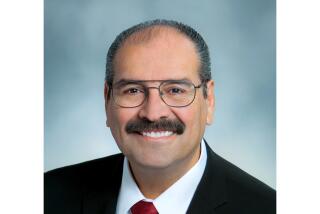Parole board chief resigns
SACRAMENTO -- — The chief executive of the state parole board, who was riding as a passenger when a subordinate was arrested last month on suspicion of driving under the influence of alcohol in a government car, submitted his resignation Monday to Gov. Arnold Schwarzenegger.
John Monday, 56, a 34-year veteran of state government, was appointed by Schwarzenegger in August and confirmed in the state Senate after serving as acting chief since May 2006.
Monday was a passenger on Nov. 27 in a car driven by Robert T. Rodriguez, 57, an associate chief deputy commissioner at the Board of Parole Hearings. Rodriguez was stopped by police in Merced just after 2 a.m. and charged with driving under the influence of alcohol. A blood test showed his blood-alcohol content was double the legal limit, police said.
“My judgment on that day was deficient and unprofessional,” Monday wrote in a letter to the governor dated Friday and submitted Monday. “I deeply regret the embarrassment I have caused the administration and my family.”
Officials at the state Department of Corrections and Rehabilitation, which includes the parole board, say they are investigating Rodriguez, who remains at work.
The two men had been speaking to inmates at a women’s prison in Chowchilla hours before, and were returning to a hotel after what Monday said was a long dinner. In his letter, he told the governor he had “consumed alcoholic beverages” at dinner during a “spontaneous” discussion of prison issues with local officials.
But Monday, who took a taxi from the roadside to his hotel after Rodriguez’s arrest, said he was not drunk, and rumors that he was had caused “unrelenting” damage.
“I was neither arrested, detained or cited,” Monday wrote.
Oscar Hidalgo, a spokesman for the corrections agency, said Monday has the right as a former civil servant to return to a civil service job and has not decided what he will do. A search is underway for a new parole board chief.
In his letter, Monday, a Republican who has served in a variety of corrections roles, sounded a bitter note in describing how he had traveled “to nearly every juvenile facility, prison and parole office in California driving literally hundreds of thousands of miles in state vehicles without ever receiving a moving violation.”
He described working 70-hour weeks, serving in the Navy and receiving appointments from three governors.
“None of this,” he wrote, “appears to be of any immediate consequence.”
More to Read
Sign up for Essential California
The most important California stories and recommendations in your inbox every morning.
You may occasionally receive promotional content from the Los Angeles Times.










